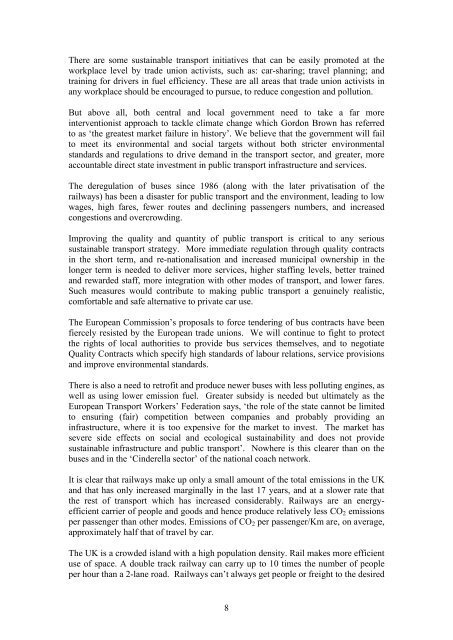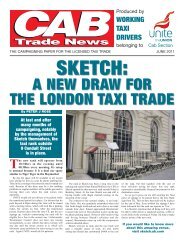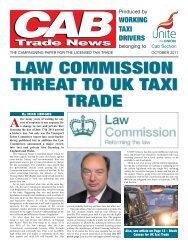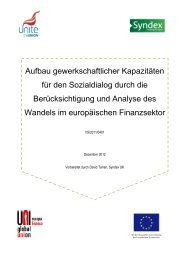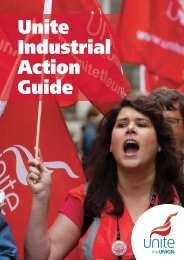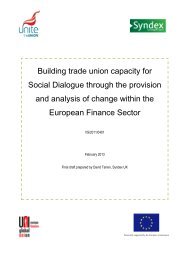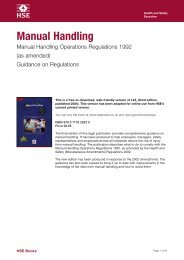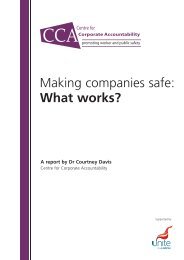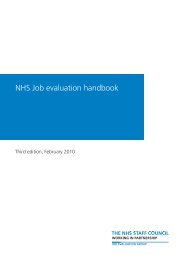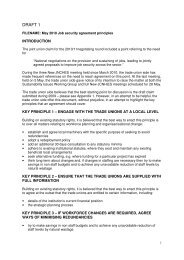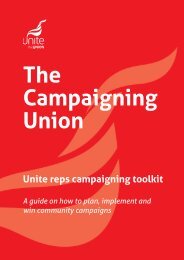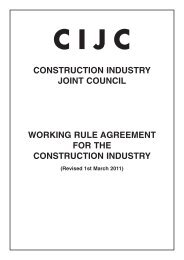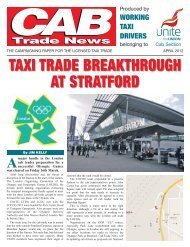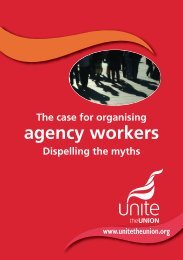Sustainable Transport and the Environment Guide - Unite the Union
Sustainable Transport and the Environment Guide - Unite the Union
Sustainable Transport and the Environment Guide - Unite the Union
You also want an ePaper? Increase the reach of your titles
YUMPU automatically turns print PDFs into web optimized ePapers that Google loves.
There are some sustainable transport initiatives that can be easily promoted at <strong>the</strong><br />
workplace level by trade union activists, such as: car-sharing; travel planning; <strong>and</strong><br />
training for drivers in fuel efficiency. These are all areas that trade union activists in<br />
any workplace should be encouraged to pursue, to reduce congestion <strong>and</strong> pollution.<br />
But above all, both central <strong>and</strong> local government need to take a far more<br />
interventionist approach to tackle climate change which Gordon Brown has referred<br />
to as ‘<strong>the</strong> greatest market failure in history’. We believe that <strong>the</strong> government will fail<br />
to meet its environmental <strong>and</strong> social targets without both stricter environmental<br />
st<strong>and</strong>ards <strong>and</strong> regulations to drive dem<strong>and</strong> in <strong>the</strong> transport sector, <strong>and</strong> greater, more<br />
accountable direct state investment in public transport infrastructure <strong>and</strong> services.<br />
The deregulation of buses since 1986 (along with <strong>the</strong> later privatisation of <strong>the</strong><br />
railways) has been a disaster for public transport <strong>and</strong> <strong>the</strong> environment, leading to low<br />
wages, high fares, fewer routes <strong>and</strong> declining passengers numbers, <strong>and</strong> increased<br />
congestions <strong>and</strong> overcrowding.<br />
Improving <strong>the</strong> quality <strong>and</strong> quantity of public transport is critical to any serious<br />
sustainable transport strategy. More immediate regulation through quality contracts<br />
in <strong>the</strong> short term, <strong>and</strong> re-nationalisation <strong>and</strong> increased municipal ownership in <strong>the</strong><br />
longer term is needed to deliver more services, higher staffing levels, better trained<br />
<strong>and</strong> rewarded staff, more integration with o<strong>the</strong>r modes of transport, <strong>and</strong> lower fares.<br />
Such measures would contribute to making public transport a genuinely realistic,<br />
comfortable <strong>and</strong> safe alternative to private car use.<br />
The European Commission’s proposals to force tendering of bus contracts have been<br />
fiercely resisted by <strong>the</strong> European trade unions. We will continue to fight to protect<br />
<strong>the</strong> rights of local authorities to provide bus services <strong>the</strong>mselves, <strong>and</strong> to negotiate<br />
Quality Contracts which specify high st<strong>and</strong>ards of labour relations, service provisions<br />
<strong>and</strong> improve environmental st<strong>and</strong>ards.<br />
There is also a need to retrofit <strong>and</strong> produce newer buses with less polluting engines, as<br />
well as using lower emission fuel. Greater subsidy is needed but ultimately as <strong>the</strong><br />
European <strong>Transport</strong> Workers’ Federation says, ‘<strong>the</strong> role of <strong>the</strong> state cannot be limited<br />
to ensuring (fair) competition between companies <strong>and</strong> probably providing an<br />
infrastructure, where it is too expensive for <strong>the</strong> market to invest. The market has<br />
severe side effects on social <strong>and</strong> ecological sustainability <strong>and</strong> does not provide<br />
sustainable infrastructure <strong>and</strong> public transport’. Nowhere is this clearer than on <strong>the</strong><br />
buses <strong>and</strong> in <strong>the</strong> ‘Cinderella sector’ of <strong>the</strong> national coach network.<br />
It is clear that railways make up only a small amount of <strong>the</strong> total emissions in <strong>the</strong> UK<br />
<strong>and</strong> that has only increased marginally in <strong>the</strong> last 17 years, <strong>and</strong> at a slower rate that<br />
<strong>the</strong> rest of transport which has increased considerably. Railways are an energyefficient<br />
carrier of people <strong>and</strong> goods <strong>and</strong> hence produce relatively less CO 2 emissions<br />
per passenger than o<strong>the</strong>r modes. Emissions of CO 2 per passenger/Km are, on average,<br />
approximately half that of travel by car.<br />
The UK is a crowded isl<strong>and</strong> with a high population density. Rail makes more efficient<br />
use of space. A double track railway can carry up to 10 times <strong>the</strong> number of people<br />
per hour than a 2-lane road. Railways can’t always get people or freight to <strong>the</strong> desired<br />
8


